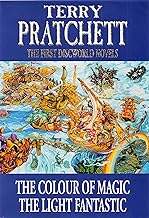No cover image available
The First Discworld Novels: The Colour of Magic and The Light Fantastic
4.5/5
Category
Books
Sophie Laurent
Oct 3, 2025
3 min read
A Turtle All the Way Down: Unpacking Pratchett's Foundational Fantasy
Terry Pratchett didn’t simply *write* fantasy; he disassembled it, lovingly mocked its tropes, and then rebuilt it into something gloriously unique. *The Colour of Magic* and *The Light Fantastic*, often bundled as the first two Discworld novels, aren’t polished gems in the traditional sense; they'r...
Terry Pratchett didn’t simply *write* fantasy; he disassembled it, lovingly mocked its tropes, and then rebuilt it into something gloriously unique. *The Colour of Magic* and *The Light Fantastic*, often bundled as the first two Discworld novels, aren’t polished gems in the traditional sense; they're raw, exuberant experiments brimming with potential. To approach them expecting the tightly-woven narratives of later works like *Night Watch* or *Small Gods* is to miss the point entirely. These books are about *finding* the voice, establishing the world, and laying the groundwork for a satirical empire.

The cover design itself is wonderfully indicative of this early chaos. That vibrant blue, dominated by a fantastical illustration depicting ships sailing on islands atop a giant turtle’s shell – it’s not sleek or refined. It *is* the Discworld: a bit ramshackle, utterly improbable, and yet undeniably captivating. The ornate gold lettering announcing “Terry Pratchett” lends a slight air of legitimacy, hinting at the brilliance to come while simultaneously being undermined by the sheer joyous absurdity of the scene below. It's a visual promise of both adventure and parody – a perfect encapsulation of Pratchett’s style.
Initially, *The Colour of Magic* reads like a pastiche of classic fantasy – the hapless hero Rincewind, a wizard utterly devoid of magical talent, is thrust into an adventure alongside the two-headed Silvers. However, Terry Pratchett quickly subverts expectations. The “magic” itself is less about spells and incantations and more a force of physics, governed by narrative necessity and belief. This is where the genius begins to shine. Pratchett doesn’t just tell a story; he *comments* on storytelling itself, deconstructing the conventions of the genre with witty prose and sharp observations.
*The Light Fantastic*, building on this foundation, demonstrates a growing confidence in Pratchett’s voice. The stakes are higher – the sun is going out, and only Rincewind can (accidentally) save the day. The character development, while not deeply psychological, is surprisingly effective. Rincewind evolves from a purely reactive figure to someone who actively resists his fate, albeit with constant complaining. He’s the archetypal reluctant hero, but Terry Pratchett imbues him with a profoundly relatable cynicism and self-preservation instinct.
The humor, admittedly, is often broad in these early works – slapstick routines and exaggerated characters abound. But beneath the silliness lies a sophisticated understanding of human nature, power dynamics, and the inherent absurdity of existence. Pratchett isn’t simply poking fun at fantasy tropes; he's using them to explore deeper themes about belief, free will, and the stories we tell ourselves.
For readers accustomed to contemporary literary fiction, these novels might initially feel jarring. They lack the nuanced character studies and introspective prose of authors like Elena Ferrante or Kazuo Ishiguro. However, I urge you to embrace the playful spirit and appreciate Pratchett’s masterful satire. This isn't just escapism; it's a clever commentary on the very nature of narrative.
I wholeheartedly recommend *The Colour of Magic* and *The Light Fantastic* to anyone who enjoys witty prose, clever world-building, and a healthy dose of subversion. Consider it an origin story – not just for the Discworld, but for a writer who would become one of the most beloved and influential authors of our time. Be prepared to laugh, be prepared to think, and above all, be prepared for a turtle all the way down.
About the Reviewer
S
Sophie Laurent
Literary Fiction, Contemporary Fiction, Creative Writing, Literary Criticism, World Literature
Literary critic for The Guardian and creative writing professor at King's College London. Author of the acclaimed novel "The Silent Orchestra" and regular judge for the Booker Prize.
Related Reviews
Comments
0
No comments yet
Be the first to share your thoughts on this review!